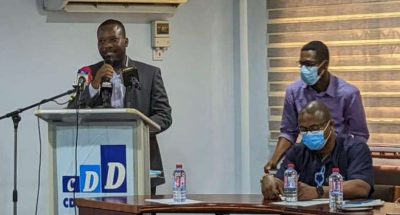A Policy Analyst at the Integrated Social Development Centre (ISODEC,) Mr. Bernard Anaba has cautioned that government stands to struggle for acce
A Policy Analyst at the Integrated Social Development Centre (ISODEC,) Mr. Bernard Anaba has cautioned that government stands to struggle for access to funds from donor partners should the anti-gay bill before parliament be passed.
It can be recalled that in June 2021 the ‘Promotion of Proper Human Sexual Rights and Family Values Bill 2021’ was presented to Parliament.
The Bill prescribes that people of the same sex who engage in sexual activity could spend up to 10 years in jail.
Since its introduction, a group of Parliamentarians led by Ningo Prampram MP Sam George and with support from some Civil Society Organisations, religious and community leaders has been pushing for its passage into law.
At a workshop in Accra organised by the Ghana Center for Democratic Development (CDD-Ghana) on the topic ‘Proper Sexual Rights and Ghanaian Family Values Bill and its Potential Impact on the Economy, Mr. Bernard Anaba presented an argument on why government must have an interest and probably see to it that the private member’s bill is not passed.
The policy analyst noted that the Bill is going to be a source of social disorder and its economic impact on Ghana’s struggling economy could be dire.
“The Bill is contradictory to the universality of self-ownership and undeniable fundamental rights that has no alternative in the scheme of social order. If you are going to say that people do not have the right to themselves then what we are saying is that they should bring back slavery or we are saying that we shouldn’t interact altogether.
“The relatively weak economic position and heavy reliance on external financing in grants particularly expose Ghana to considerable economic impact if diplomatic tensions lead to reduced interest in Ghana. The resultant indirect cost to the economy as a result of possible diplomatic tension, reduced or delayed grants mostly from the west where Ghana has been dependent will be huge,” Mr. Bernard Anaba explained.
He said for a country whose annual budget relies on 4-6% on foreign aid, passing an anti-gay bill is sure to bring unwanted consequences.
The Policy Analyst further argued that the passing of the bill will mean Ghana will go against a number of UN human rights conventions it has already signed onto.
According to him, this will also attract a blowback on the country and will result in diplomatic tensions as well.
“Ghana is a signatory to a number of United Nations Human Rights Conventions and we know that a lot of our external partners are against the passage of this bill. If we are going against the UN order of human rights of which significant provisions of this bill contradicts even in our constitution, then it is going to bring about diplomatic tension between officials of Ghana and UN officials,” Mr. Bernard Anaba noted.
He told journalists that the government should conduct a broad cost-benefit analysis of the bill to avoid a potential repercussion of economic impact already triggered by the consideration of the bill.
Mr. Anaba insists that at a time where Ghana is signed onto many global covenants on human rights, there is the need to critically look at its obligations before passing the anti-gay rights bill to avoid any unnecessary blowback that would be costly.
“Government may need to consider whether the bill will have a positive economic impact or it will impose an unneeded economic cost,” the Policy Analyst stressed.
Joining the workshop via zoom, economist and political risk analyst, Theophilus Acheampong suggested that government conduct a cost-benefit analysis on the passing of the bill.
He further called for an anonymous survey to find out which sectors of the economy are LGBTQ+ individuals most likely to be, establish the nature of the scale of the exclusion that they face, and address the effects of stigma targeted at these individuals.

COMMENTS